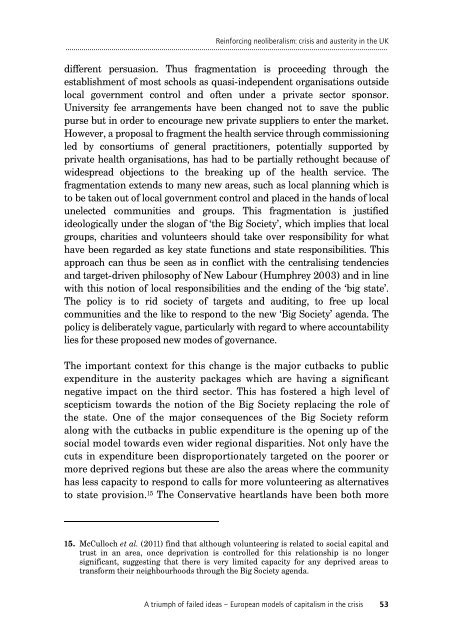A triumph of failed ideas European models of capitalism in ... - Journal
A triumph of failed ideas European models of capitalism in ... - Journal
A triumph of failed ideas European models of capitalism in ... - Journal
Create successful ePaper yourself
Turn your PDF publications into a flip-book with our unique Google optimized e-Paper software.
Re<strong>in</strong>forc<strong>in</strong>g neoliberalism: crisis and austerity <strong>in</strong> the UK.................................................................................................................................................................different persuasion. Thus fragmentation is proceed<strong>in</strong>g through theestablishment <strong>of</strong> most schools as quasi-<strong>in</strong>dependent organisations outsidelocal government control and <strong>of</strong>ten under a private sector sponsor.University fee arrangements have been changed not to save the publicpurse but <strong>in</strong> order to encourage new private suppliers to enter the market.However, a proposal to fragment the health service through commission<strong>in</strong>gled by consortiums <strong>of</strong> general practitioners, potentially supported byprivate health organisations, has had to be partially rethought because <strong>of</strong>widespread objections to the break<strong>in</strong>g up <strong>of</strong> the health service. Thefragmentation extends to many new areas, such as local plann<strong>in</strong>g which isto be taken out <strong>of</strong> local government control and placed <strong>in</strong> the hands <strong>of</strong> localunelected communities and groups. This fragmentation is justifiedideologically under the slogan <strong>of</strong> ‘the Big Society’, which implies that localgroups, charities and volunteers should take over responsibility for whathave been regarded as key state functions and state responsibilities. Thisapproach can thus be seen as <strong>in</strong> conflict with the centralis<strong>in</strong>g tendenciesand target-driven philosophy <strong>of</strong> New Labour (Humphrey 2003) and <strong>in</strong> l<strong>in</strong>ewith this notion <strong>of</strong> local responsibilities and the end<strong>in</strong>g <strong>of</strong> the ‘big state’.The policy is to rid society <strong>of</strong> targets and audit<strong>in</strong>g, to free up localcommunities and the like to respond to the new ‘Big Society’ agenda. Thepolicy is deliberately vague, particularly with regard to where accountabilitylies for these proposed new modes <strong>of</strong> governance.The important context for this change is the major cutbacks to publicexpenditure <strong>in</strong> the austerity packages which are hav<strong>in</strong>g a significantnegative impact on the third sector. This has fostered a high level <strong>of</strong>scepticism towards the notion <strong>of</strong> the Big Society replac<strong>in</strong>g the role <strong>of</strong>the state. One <strong>of</strong> the major consequences <strong>of</strong> the Big Society reformalong with the cutbacks <strong>in</strong> public expenditure is the open<strong>in</strong>g up <strong>of</strong> thesocial model towards even wider regional disparities. Not only have thecuts <strong>in</strong> expenditure been disproportionately targeted on the poorer ormore deprived regions but these are also the areas where the communityhas less capacity to respond to calls for more volunteer<strong>in</strong>g as alternativesto state provision. 15 The Conservative heartlands have been both more15. McCulloch et al. (2011) f<strong>in</strong>d that although volunteer<strong>in</strong>g is related to social capital andtrust <strong>in</strong> an area, once deprivation is controlled for this relationship is no longersignificant, suggest<strong>in</strong>g that there is very limited capacity for any deprived areas totransform their neighbourhoods through the Big Society agenda.A <strong>triumph</strong> <strong>of</strong> <strong>failed</strong> <strong>ideas</strong> – <strong>European</strong> <strong>models</strong> <strong>of</strong> <strong>capitalism</strong> <strong>in</strong> the crisis 53








